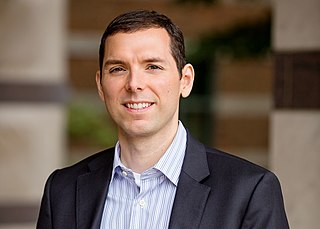
Morality is the differentiation of intentions, decisions and actions between those that are distinguished as proper (right) and those that are improper (wrong). Morality can be a body of standards or principles derived from a code of conduct from a particular philosophy, religion or culture, or it can derive from a standard that a person believes should be universal. Morality may also be specifically synonymous with "goodness" or "rightness".
Encephalization quotient (EQ), encephalization level (EL), or just encephalization is a relative brain size measure that is defined as the ratio between observed and predicted brain mass for an animal of a given size, based on nonlinear regression on a range of reference species. It has been used as a proxy for intelligence and thus as a possible way of comparing the intelligence levels of different species. For this purpose, it is a more refined measurement than the raw brain-to-body mass ratio, as it takes into account allometric effects. Expressed as a formula, the relationship has been developed for mammals and may not yield relevant results when applied outside this group.
A religious experience is a subjective experience which is interpreted within a religious framework. The concept originated in the 19th century, as a defense against the growing rationalism of Western society. William James popularised the concept. In some religions, this may result in unverified personal gnosis.

Nancy Gail Kanwisher FBA is the Walter A Rosenblith Professor of Cognitive Neuroscience in the Department of Brain and Cognitive Sciences at the Massachusetts Institute of Technology and an investigator at the McGovern Institute for Brain Research. She studies the neural and cognitive mechanisms underlying human visual perception and cognition.
Cognitive science of religion is the study of religious thought, theory, and behavior from the perspective of the cognitive and evolutionary sciences. Scholars in this field seek to explain how human minds acquire, generate, and transmit religious thoughts, practices, and schemas by means of ordinary cognitive capacities.
The evolutionary psychology of religion is the study of religious belief using evolutionary psychology principles. It is one approach to the psychology of religion. As with all other organs and organ functions, the brain's functional structure is argued to have a genetic basis, and is therefore subject to the effects of natural selection and evolution. Evolutionary psychologists seek to understand cognitive processes, religion in this case, by understanding the survival and reproductive functions they might serve.
Michael Inzlicht is professor of psychology at the University of Toronto recognized in the areas of social psychology and neuroscience. Although he has published papers on the topics of prejudice, academic performance, and religion, his most recent interests have been in the topics of self-control, where he borrows methods from affective and cognitive neuroscience to understand the underlying nature of self-control, including how it is driven by motivation.

The evolutionary origin of religion and religious behavior is a field of study related to evolutionary psychology, the origin of language and mythology, and cross-cultural comparison of the anthropology of religion. Some subjects of interest include Neolithic religion, evidence for spirituality or cultic behavior in the Upper Paleolithic, and similarities in great ape behavior.

Josep Call is a Spanish comparative psychologist specializing in primate cognition.

Attentional control, colloquially referred to as concentration, refers to an individual's capacity to choose what they pay attention to and what they ignore. It is also known as endogenous attention or executive attention. In lay terms, attentional control can be described as an individual's ability to concentrate. Primarily mediated by the frontal areas of the brain including the anterior cingulate cortex, attentional control is thought to be closely related to other executive functions such as working memory.
The New Zealand Attitudes and Values Study (NZAVS) is a longitudinal study conducted in New Zealand. The NZAVS was started in 2009 by Chris Sibley, a professor in psychology at the University of Auckland. The NZAVS was inspired by major social surveys conducted internationally, such as the National Election Studies, the World Values Survey and the General Social Survey, and aims to provide a similar resource for New Zealand. As of January 29, 2024, the NZAVS research team had published over 250 peer reviewed publications using data from the study.

Aron Keith Barbey is an American cognitive neuroscientist, who investigates the neural architecture of human intelligence and brain plasticity. Barbey is the Emanuel Donchin Professorial Scholar of Psychology and a Professor of Psychology, Neuroscience, and Bioengineering at the University of Illinois. He is director of the Decision Neuroscience Laboratory at the Beckman Institute for Advanced Science and Technology, and founding director of the Center for Brain Plasticity at the Beckman Institute, where he leads the Intelligence, Learning, and Plasticity (ILP) Initiative.

Daphné Bavelier is a French cognitive neuroscientist specialized in brain plasticity and learning. She is full Professor at the University of Geneva in the Faculty of Psychology and Educational Sciences. She heads the Brain and Learning lab at Campus Biotech in Geneva, Switzerland.

Russell "Russ" Alan Poldrack is an American psychologist and neuroscientist. He is a professor of psychology at Stanford University, associate director of Stanford Data Science, member of the Stanford Neuroscience Institute and director of the Stanford Center for Reproducible Neuroscience and the SDS Center for Open and Reproducible Science.
Cognitive ecology of religion is an integrative approach to studying how religious beliefs covary with social and natural dynamics of the environment. This is done by incorporating a cognitive ecological perspective to cross-cultural god concepts. Religious beliefs are thought to be a byproduct of domain-specific cognitive modules that give rise to religious cognition. The cognitive biases leading to religious belief are constraints on perceptions of the environment, which is part and parcel of a cognitive ecological approach. This means that they not only shape religious beliefs, but they are determinants of how successfully cultural beliefs are transmitted.

Chris G. Sibley is a Professor in the School of Psychology at the University of Auckland and the lead investigator for the New Zealand Attitudes and Values Study. Sibley's research focuses on understanding how people's connections with others around them interact with environmental and economic factors to cause change in personality, political attitudes, social values and psychological health over time. In 2014, he was the recipient of the Erik Erikson Award for Early Career Achievement, awarded by the International Society of Political Psychology. Sibley is also the editor of the Cambridge Handbook of the Psychology of Prejudice and the Cambridge Handbook of Political Psychology, as well as one of the developers of the Multi-dimensional model of Māori identity and cultural engagement.
The theory of divergent modes of religiosity (DMR) is intended to explain how religions are created, transmitted, and changed. DMR theory was first developed by anthropologist Harvey Whitehouse following his ethnographic fieldwork in Papua New Guinea. The theory proposes that religions tend to coalesce around two divergent modes, termed imagistic and doctrinal, which are distinguished primarily by their ritual practices. The imagistic mode is characterized by infrequently performed, high arousal rituals (e.g. initiation rites) and is associated with small scale, exclusive religious groups. In contrast the doctrinal mode is characterized by frequently performed, low arousal rituals (e.g. daily recitations of sacred texts) and is associated with larger inclusive communities, as found in the major world religions.
Mala Murthy is an American neuroscientist who serves as the Director of the Princeton Neuroscience Institute, and is the Karol and Marnie Marcin ’96 Professor of Neuroscience at Princeton University. Her work centers around how the brain extracts important information from the sensory world and utilises that information to modulate behavior in a social context. She is most known for her work in acoustic communication and song production in courting Drosophila fruit flies. Murthy and colleagues have also published an automated system for measuring animal pose in movies with one or more animal.

BJ Casey is an American cognitive neuroscientist and expert on adolescent brain development and self control. She is the Christina L. Williams Professor of Neuroscience at Barnard College of Columbia University where she directs the Fundamentals of the Adolescent Brain (FAB) Lab and is an Affiliated Professor of the Justice Collaboratory at Yale Law School, Yale University.
Neural synchrony is the correlation of brain activity across two or more people over time. In social and affective neuroscience, neural synchrony specifically refers to the degree of similarity between the spatio-temporal neural fluctuations of multiple people. This phenomenon represents the convergence and coupling of different people's neurocognitive systems, and it is thought to be the neural substrate for many forms of interpersonal dynamics and shared experiences. Some research also refers to neural synchrony as inter-brain synchrony, brain-to-brain coupling, inter-subject correlation, between-brain connectivity, or neural coupling. In the current literature, neural synchrony is notably distinct from intra-brain synchrony—sometimes also called neural synchrony—which denotes the coupling of activity across regions of a single individual's brain.









